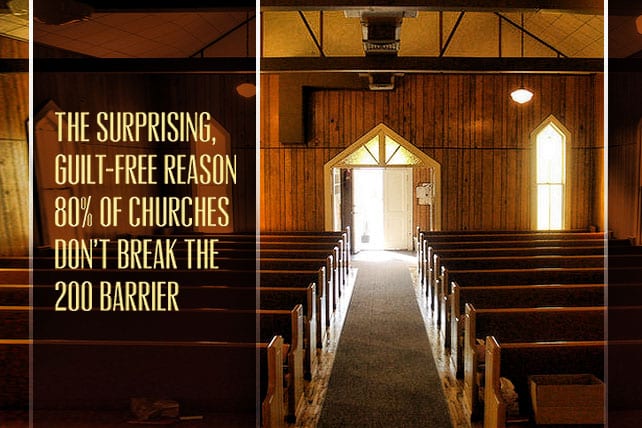Breaking through the 200 barrier.
Sometimes it feels like that’s the only pastoring principle anyone has talked about for the past 30 years.
In case you haven’t heard of it, the 200 barrier is the invisible ceiling a church must break through if it doesn’t want to be a small church any more. Do a Google search of “breaking the 200 barrier” and you’ll see what I mean.
Despite all the books, websites, seminars, classes, podcasts and denominational committees that have been dedicated to pushing churches through this barrier, one truth stubbornly remains:
80 percent of churches will never break through the 200 barrier.
Why is that? The reasons I’ve heard include:
- It requires a very different way of doing church.
- Small churches don’t want to move forward.
- We’re not working hard enough.
- We’re not praying hard enough.
- We’re not willing to learn new ideas.
- We don’t care about the Great Commission.
The first point is correct. The rest are garbage. (Feel free to use a stronger term than “garbage” if your theology will allow for it.)
Oh sure, there are some small churches that are uncaring and stuck. But there are unhealthy big churches, too.
Why I May Never Pastor a Big Church
To break through the 200 barrier, a church and its leadership must adapt to a different way of doing church. They have to become more systems oriented. Pastors need to do less one-on-one ministry themselves and delegate more of it to staff members and volunteers.
That’s a good thing. As a church gets bigger, those changes will allow more people to do ministry, helping the pastor not to be a stressed-out, overworked bottleneck.
Here’s why my church will probably never break through the 200 barrier. (It’s the one thing none of us wants to admit. But someone needs to say it out loud.)
I stink at it.
I’m not called or gifted to manage systems as my primary method of doing ministry.
Pastoring a big church isn’t just a matter of learning a new set of skills. Although that certainly helps. It starts by being gifted for it and called to it. Without that, all the skill in the world—even all the prayers you can pray—won’t make it work for you.
Believe me, if praying hard and/or learning new skills was all it took to get a church through the 200 barrier, mine would have busted through it years ago. So would most of the small churches I know.













